Uncover the pivotal role of biblical hirelings, where loyalty, work ethics, and divine narratives entwine, urging a deeper reflection on labor's value today.
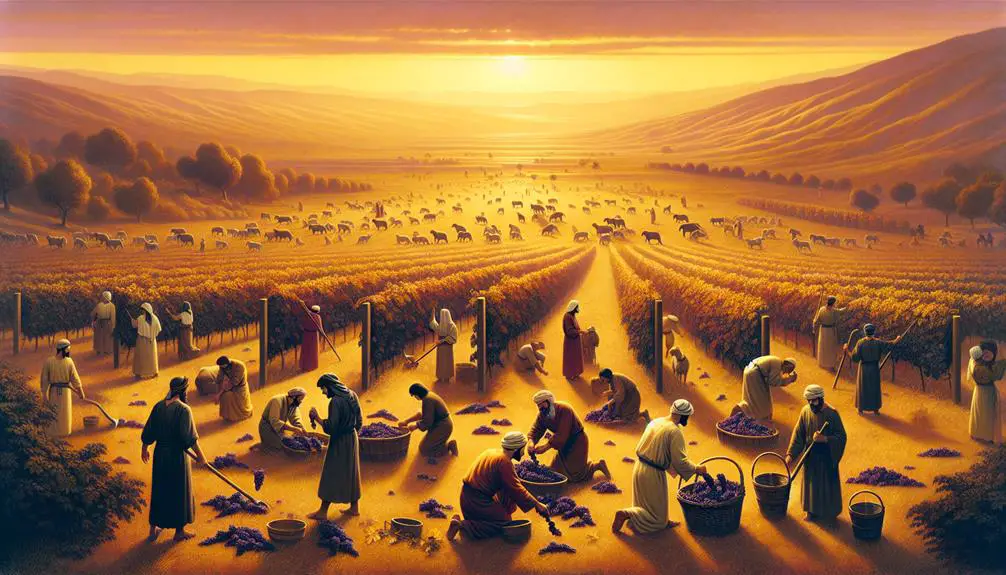
Hirelings in the Bible
As you navigate through the tapestry of stories in the Bible, you'll find that hirelings aren't just background characters; they're pivotal players in a larger narrative of loyalty, sustenance, and betrayal. These hired hands, often shepherds or laborers, serve as a mirror reflecting the varied conditions and attitudes toward work and workers in biblical times.
Their experiences offer you a glimpse into the socio-economic dynamics of the ancient Near East and carry forward spiritual symbolism that resonates even today. Unraveling their stories, you'll uncover a complex interplay of ethics, duty, and divine providence, compelling you to question how these ancient narratives influence our understanding of labor and worth in the modern world.
Key Takeaways
- Hirelings in the Bible represent temporary laborers with low social status and vulnerable working conditions.
- Biblical narratives like Jacob's Wages and The Parable of the Vineyard Workers offer insights into labor justice and divine intervention.
- The treatment and rights of hirelings in the Bible highlight the importance of ethical conduct and moral obligations in labor relations.
- Hirelings symbolize the transient nature of earthly work and encourage reflection on spiritual principles and societal impacts of professional life.
Definition and Roles
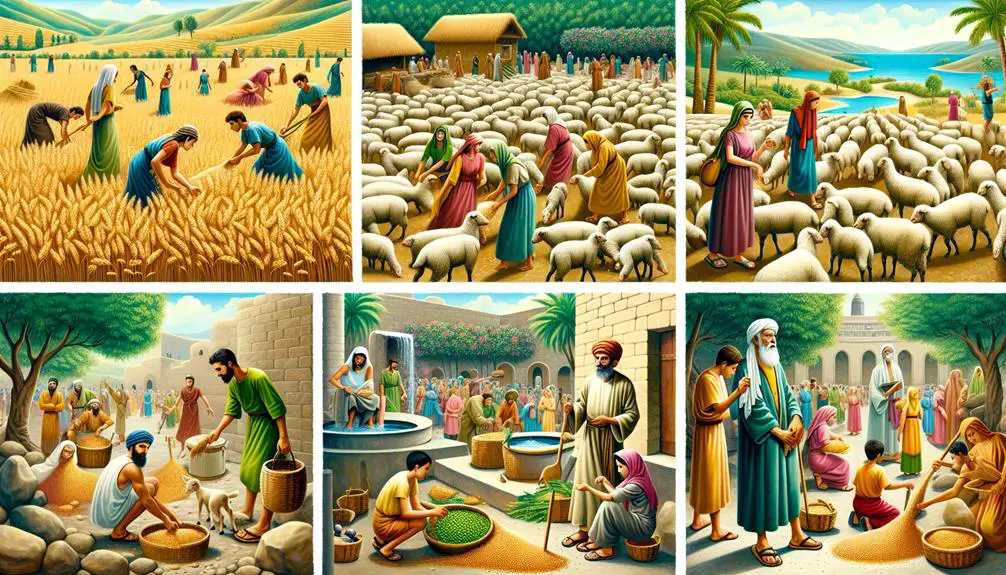
In biblical contexts, a hireling refers to an individual employed on a temporary basis, often for manual labor or specific tasks, embodying a role that's both crucial and complex within the socio-economic frameworks of ancient societies. You'll find that their social status and the payment practices tied to their employment are indicative of the broader economic and social structures of the time.
Hirelings often occupied a lower social status due to the temporary and sometimes unpredictable nature of their employment. This instability didn't just reflect their economic situation but also influenced their position within the social hierarchy. Payment practices for hirelings were equally telling. Typically, they received compensation at the end of each day's work, a practice deeply rooted in the societal norms and laws of the time, emphasizing the immediacy of their needs and the precariousness of their employment.
The socio-economic position of hirelings illuminates the stratification within ancient societies, highlighting the dependency on a labor system that was both flexible and exploitable. This analysis underscores the complexity of their roles, not just as workers but as pivotal figures within the historical tapestry, navigating the challenges of their status and the mechanisms of their compensation.
Biblical Examples
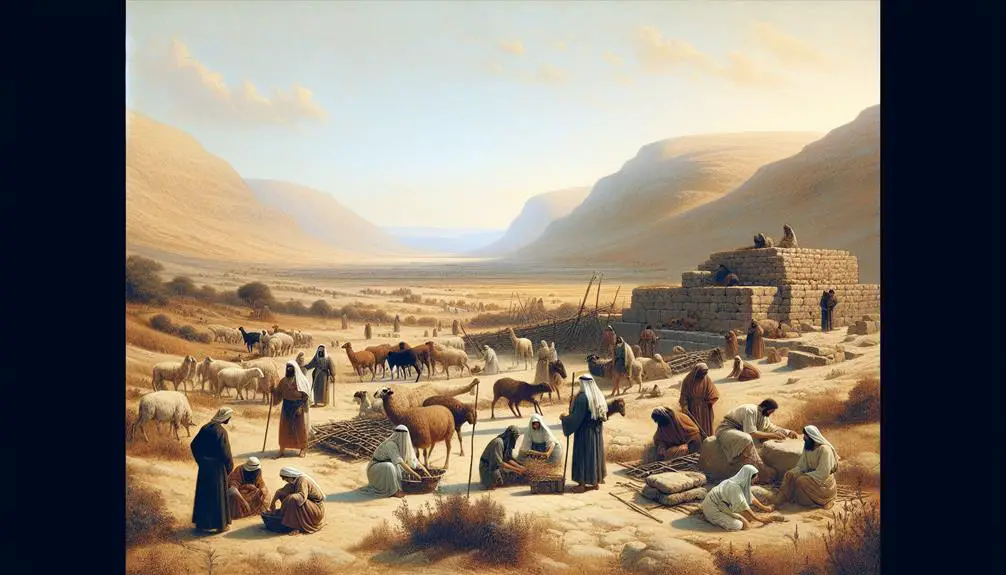
Throughout the Bible, various narratives and parables highlight the roles and experiences of hirelings, shedding light on their significance within these ancient texts. You'll find that these stories often delve into the complexities of labor, contracts, and fairness, offering profound insights into the human condition and divine justice.
One notable example is the story of Jacob's Wages in the book of Genesis. Jacob's agreement with Laban over the wages for his labor—specifically, the speckled and spotted sheep—serves as a seminal exploration of labor relations, wages, and divine intervention in ensuring fair treatment. This narrative doesn't just illustrate the challenges faced by workers in securing just compensation; it also underscores the role of faith and divine justice in rectifying inequities in labor agreements.
Similarly, the Parable of the Vineyard Workers in the Gospel of Matthew presents another intriguing perspective on labor and compensation. In this parable, workers hired at different times of the day receive the same wages, a decision that sparks controversy among them. This story probes into the kingdom of heaven's principles of generosity and fairness, challenging conventional notions of labor compensation.
These examples embody the Bible's nuanced exploration of the lives and rights of hirelings, offering timeless lessons on justice, fairness, and the divine perspective on labor.
Working Conditions
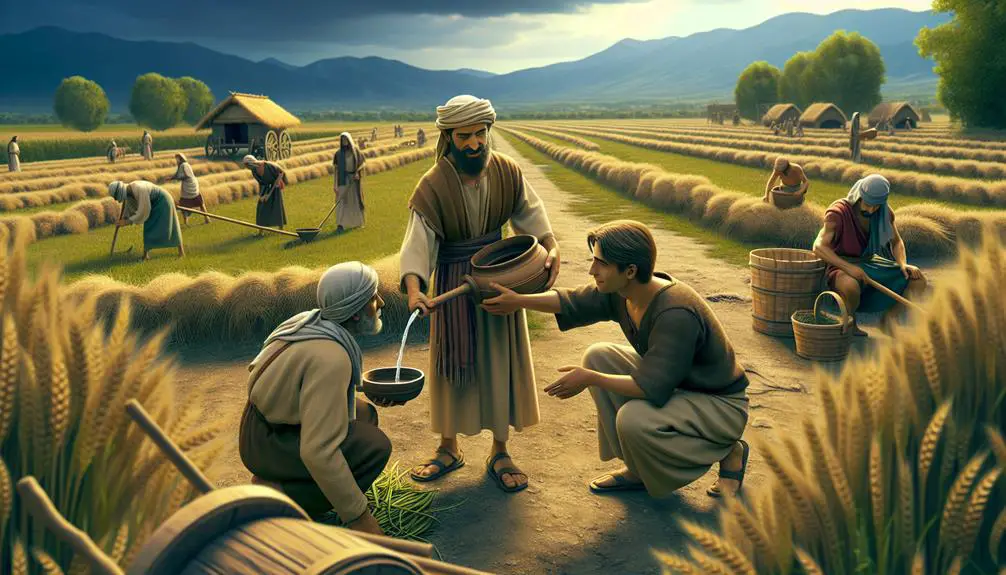
Analyzing the working conditions of hirelings in biblical narratives reveals a complex interplay of ethical, social, and economic factors that shape their experiences and treatment. These laborers, often at the bottom of the societal hierarchy, faced challenges that echo modern concerns over labor rights and payment practices.
In the biblical context, hirelings' working conditions were influenced by:
- Labor rights: Unlike today's legal frameworks, ancient labor rights were minimal, leaving hirelings vulnerable to exploitation.
- Payment practices: Prompt payment was crucial for hirelings, who lived hand-to-mouth. Delays or withholdings could spell disaster for them and their families.
- Social status: Being a hireling was often associated with low social status, which impacted their treatment and opportunities.
- Job security: Hirelings lacked job security, making them dependent on the whims of their employers.
- Access to justice: In disputes, hirelings had limited recourse, making it challenging to contest unfair treatment or wages.
These elements combined to create a precarious existence for hirelings, underscoring the timeless nature of concerns around fair treatment, wages, and labor rights.
Spiritual Symbolism

Moving beyond the tangible aspects of hirelings' lives, it's crucial to explore the rich spiritual symbolism these figures embody within the biblical narrative. This exploration reveals layers of meaning regarding divine assignment and moral obligations, framing hirelings not just as historical figures but as symbols within a broader spiritual context.
Spiritual Symbolism |
Implication |
|---|---|
Temporary Stewardship |
Hirelings symbolize the transient nature of earthly assignments, urging a reflection on how one fulfills divine tasks. |
Moral Accountability |
Their roles underscore the importance of ethical conduct and integrity, highlighting the moral obligations tied to every task. |
Divine Dependence |
They reflect humanity's dependence on divine guidance for fulfilling earthly duties, emphasizing trust in a higher power. |
Service and Reward |
The relationship between work and reward in their lives illustrates the spiritual principle of reaping what one sows, encouraging diligence and faithfulness. |
Contrast with True Shepherds |
By contrasting hirelings with genuine shepherds, scripture delineates the depth of commitment required in spiritual leadership and the dangers of superficial engagement. |
Through this lens, you're invited to consider how these biblical hirelings, far from mere historical footnotes, symbolize enduring spiritual truths about divine assignment and moral obligations, offering profound insights into human character and divine expectations.
Modern Applications

In today's rapidly evolving society, the spiritual and moral implications of being a 'hireling,' as depicted in biblical narratives, offer significant insights into contemporary work ethics and personal accountability. The concept of a 'hireling,' primarily seen as a laborer working solely for financial gain, forces you to examine the depth of your commitment in professional environments. This scrutiny reveals the broader ethical considerations and societal impacts of our work-related decisions.
- Accountability: You're urged to reflect on your accountability not just to your employer, but also to the wider community your work affects.
- Service Orientation: It challenges you to look beyond monetary compensation and find value in service and contribution.
- Ethical Work Practices: Emphasizes the importance of adopting ethical practices in your professional endeavors, highlighting the consequences of neglecting such responsibilities.
- Community Impact: Encourages you to consider how your work contributes to or detracts from societal welfare.
- Personal Integrity: Calls for a reevaluation of personal integrity in your professional life, urging a balance between self-interest and the common good.
The ancient role of hirelings, therefore, prompts a reevaluation of modern work ethics and personal accountability, underscoring the need for a conscientious approach to professional life.
Frequently Asked Questions
How Did the Legal Rights and Protections for Hirelings in Biblical Times Compare to Those of Modern-Day Employees?
You're looking at how historical employment rights and protections stack up against today's standards. In ancient times, hirelings had basic rights but lacked many of the protections modern-day employees enjoy, due to legal evolutions and ethical considerations.
Modern parallels show a significant shift towards worker rights, including health benefits, job security, and fair wages. This evolution reflects a deeper understanding of worker value and ethical considerations in employment practices.
In What Ways Did the Treatment of Hirelings Reflect the Social and Economic Disparities of Biblical Societies?
You're exploring how treatment of workers reveals social and economic disparities within a society. In this context, social hierarchy and economic dependency are key. They show how those at the bottom, like hirelings, often faced harsh conditions due to their lower status.
This not only underscores the vast gap between social classes but also highlights the reliance of the lower classes on their employers for survival, reflecting broader societal inequalities.
Were There Any Specific Rituals or Religious Practices Associated With Becoming or Working as a Hireling in the Bible?
You're diving into whether specific rituals or religious practices were linked to becoming or working as a hireling, and it's intriguing.
The Bible doesn't explicitly detail ceremonial purification or sacrificial offerings for hirelings. This suggests such practices weren't standard for their role.
Instead, the focus was more on moral and ethical guidelines for treatment rather than ritualistic ceremonies, indicating a separation of their economic function from religious or ceremonial obligations.
How Did the Concept of a Hireling Differ Across Various Cultures and Civilizations Contemporary With the Biblical Era?
You'll find that the concept of a hireling varied widely across cultures contemporary with the biblical era. Ancient Guilds and Trade Routes played pivotal roles.
In some civilizations, hirelings were akin to apprentices, deeply integrated into guilds, learning trades and secrets. Elsewhere, on bustling trade routes, they were essential for transport and commerce, their roles more fluid and less tied to formal structures.
This diversity reflects the rich tapestry of ancient labor markets.
Can the Biblical Portrayal of Hirelings Provide Insight Into the Historical Development of Labor Laws and Workers' Rights?
Exploring biblical portrayals can offer you deep insights into the evolution of labor laws and workers' rights. These narratives, rich with spiritual metaphors, often contrast the commitment of a shepherd to their flock against the less invested hireling.
This distinction highlights early notions of pastoral care and responsibility in the workplace. Analyzing these stories, you'll grasp how ancient texts reflect and possibly influenced the development of societal norms around labor and care.
Conclusion
In the tapestry of biblical narratives, hirelings emerge not merely as laborers but as vessels carrying deeper spiritual truths. You've journeyed through their roles, from the pastoral fields to the metaphoric realms, where their toils under the sun mirror the human condition's complexities.
As you reflect on their stories, it's clear: their footprints across ancient sands speak to modern souls about dignity, purpose, and our shared quest for meaning amidst life's fleeting seasons. This exploration, rich in detail and analysis, invites you to ponder their enduring legacy.


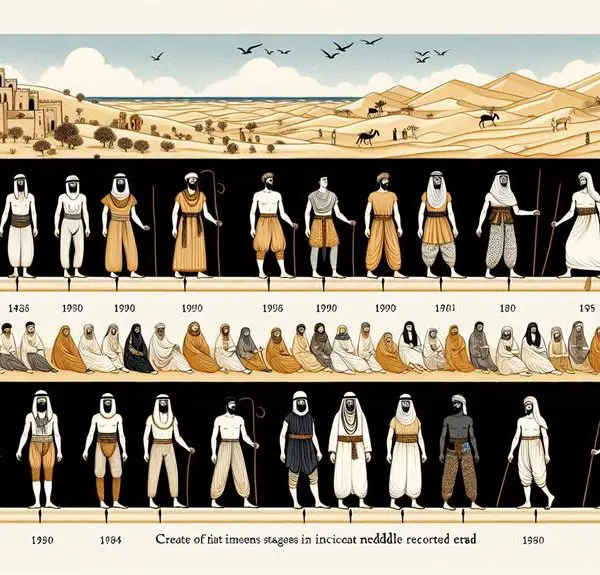
Sign up